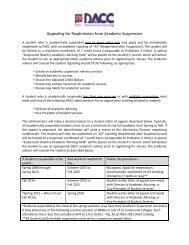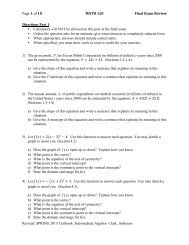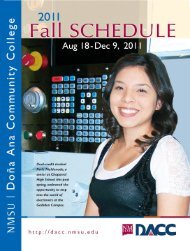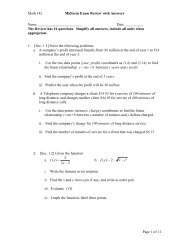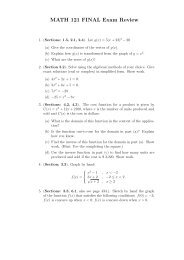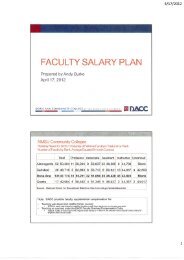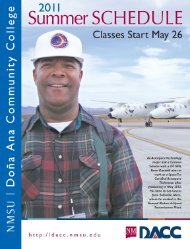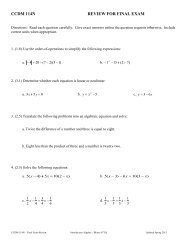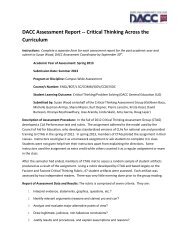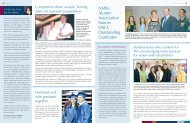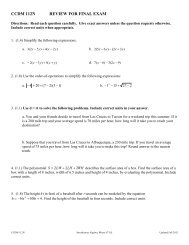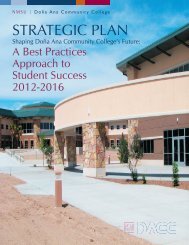DACC Catalog - Dona Ana Community College - New Mexico State ...
DACC Catalog - Dona Ana Community College - New Mexico State ...
DACC Catalog - Dona Ana Community College - New Mexico State ...
You also want an ePaper? Increase the reach of your titles
YUMPU automatically turns print PDFs into web optimized ePapers that Google loves.
96 Doña <strong>Ana</strong> <strong>Community</strong> <strong>College</strong>ECED—Early Childhood EducationECED 115. Child Growth, Development, and Learning3 cr.This basic course in the growth, development, and learning of young children, prenatalthrough age eight, provides students with the theoretical foundation for becomingcompetent early childhood professionals.ECED 125. Health, Safety, and Nutrition2 cr.This course provides information related to standards and practices that promote children’sphysical and mental well being sound nutritional practices, and maintenanceof safe learning environments.ECED 135. Family and <strong>Community</strong> Collaboration3 cr.This beginning course examines the involvement of families and communities fromdiverse cultural and linguistic backgrounds in early childhood programs. Ways toestablishes collaborative relationships with families in early childhood settings is discussed.Prerequisites: ECED 115 and ENGL 111G.ECED 215. Curriculum Development Through Play3 cr.The beginning curriculum course places play at the center of curriculum in developmentallyappropriate early childhood programs. It addresses content that is relevantfor children birth through age four and developmentally and culturally sensitive waysof integrating content into teaching and learning experiences. Information on adaptingcontent areas to meet the needs of children with diverse abilities and the developmentof IFSP’s and IEP’s is included. Consent of instructor required. Prerequisites:ECED 115 and ENGL 111G. Corequisite: ECED 220.ECED 220. Early Childhood Education Practicum I2 cr.The beginning practicum course will provide experiences that address curriculumcontent that is relevant for children birth through age four in developmentally andculturally sensitive ways. Consent of instructor required. Prerequisites: ECED 115 andENGL 111G. Corequisite: ECED 215.ECED 225. Curriculum Development and Implementation II3 cr.The second curriculum course focuses on developmentally appropriate curriculumcontent in early childhood programs, age 3 through third grade. Development andimplementation of curriculum in all content areas, including literacy, numeracy, thearts, health and emotional wellness, science, motor and social skills, is emphasized.Information on adapting content areas to meet the needs of children with diverseabilities and the development of IEP’s is included. Consent of instructor required.Prerequisites: ECED 115 and ENGL 111G. Corequisite: ECED 230.ECED 230. Early Childhood Education Practicum II2 cr.The second field-based curriculum course focuses on practicing developmentally appropriatecurriculum content in early childhood programs, age 3 through third grade.Consent of instructor required. Prerequisites: ECED 115, ENGL 111G,. Corequisite:ECED 225.ECED 235. Introduction to Language, Literacy and Reading3 cr.This course is designed to prepare early childhood professionals for promoting children’semergent literacy and reading development. Through a developmental approach,the course addresses ways in which early childhood professionals can fosteryoung children’s oral language development, phonemic awareness, and literacyproblem solving skills, fluency, vocabulary, and comprehension. Prerequisites: ECED115 and ENGL 111G.ECED 245. Professionalism2 cr.This course provides a broad-based orientation to the field of early care and education.Early childhood history, philosophy, ethics and advocacy are introduced. Basicprinciples of early childhood systems are explored. Multiple perspectives on earlycare and education are introduced. Professional responsibilities such as cultural responsivenessand reflective practice are examined.ECED 250. Independent Study1–3 cr.Independent study for specific area of early childhood education. Prerequisite: Consentof instructor. Restricted to majors.ECED 255. Assessment of Children and Evaluation of Programs 3 cr.This basic course familiarizes students with a variety of culturally appropriate assessmentmethods and instruments, including systematic observation of typicallyand non-typically developing children. Prerequisites: ECED 115 and ENGL 111G.Crosslisted with: SPED 255.ECED 265. Guiding Young Children3 cr.This course explores various theories of child guidance and the practical applicationsof each. It provides developmentally appropriate methods for guiding children andeffective strategies and suggestions for facilitating positive social interactions. Strategiesfor preventing challenging behaviors through the use of environment, routinesand schedule will be presented.ECED 270. Program Management3 cr.Technical knowledge necessary to develop and maintain a quality early care and educationprogram. The course will focus on sound financial management and vision,laws and legal issues that affect programs and state and national standards includingaccreditation requirements. Prerequisite: consent of instructor.ECED 275. Curriculum for Diverse Learners and Their Families3 cr.Implementation of family-centered programming that includes developmentally appropriateand culturally responsive curriculum. The course will also cover the establishmentand maintenance of healthy and safe learning environments. Consent ofinstructor required.ECED 276. Effective Program Development for Diverse Learners and TheirFamilies2 cr.Practical experience in observing and carrying out the role of the director/administratorin the implementation of family-centered programming that includes individuallyappropriate and culturally responsive curriculum in a healthy and safe learningenvironment. Consent of instructor required. Corequisite: ECED 275. Restricted toECED majors.ECED 280. Professional Relationships3 cr.Development of staff relationships that will foster strong professional relationshipswith and among families, communities and advisory boards. Issues of staff recruitment,retention, support and supervision will lay a foundation for positive personnelmanagement. Working effectively with board, advisory groups and communitymembers and agencies will be addressed. Consent of instructor required. Corequisite:ECED 281.ECED 281. Professional Relationships Practicum2 cr.Practical experience in the development of staff relationship that will foster professionalrelationships with families, communities and boards. Issues of staff recruitment,retention, support and supervision will lay a foundation for positive personnelmanagement. Consent of instructor required. Corequisite: ECED 280. Restricted toECED majors.ECON—EconomicsECON 201G. Introduction to Economics3 cr.Economic institutions and current issues with special emphasis on the Americaneconomy.ECON 251G. Principles of Macroeconomics3 cr.Macroeconomic theory and public policy: national income concepts, unemployment,inflation, economic growth, and international payment problems.ECON 252G. Principles of Microeconomics3 cr.Microeconomic theory and public policy: supply and demand, theory of the firm,market allocation of resources, income distribution, competition and monopoly, governmentalregulation of businesses and unions.EDUC—EducationEDUC 103. Internship in Bilingual Education/ESL1–4 cr.Supervised experience in bilingual education/ESL elementary or secondary classroomsettings for prospective bilingual education/ESL teachers.EDUC 150. Math for Paraprofessionals3 cr.Applied math skills for paraprofessionals working with children. Prerequisite:CCDM 103.EDUC 151. Math for Paraprofessionals II3 cr.Applied math skills for paraprofessionals working under the direction of a teacher.Prerequisite: EDUC 150.EDUC 181. Field Experience I1 cr.Introduction to public school teaching, school visits, classroom observations and discussionseminar.EDUC 204. Foundations of Bilingual/ESL Education3 cr.Explore and review the historical, legal, philosophical, theoretical and pedagogicalparadigms of bilingual/ESL education.ELT—Electronics TechnologyELT 105. Basic Electricity and Electronics3 cr. (2+2P)Fundamentals of electricity and electronics, basic circuit devices, meters, transistors,integrated circuits and other solid state devices, computers, fiber optics, and industrialapplication topics. Minimum math proficiency of CCDM 103 or CCDM 104required or math placement into CCDM 114 or higher. Crosslisted with: AERT 111.



